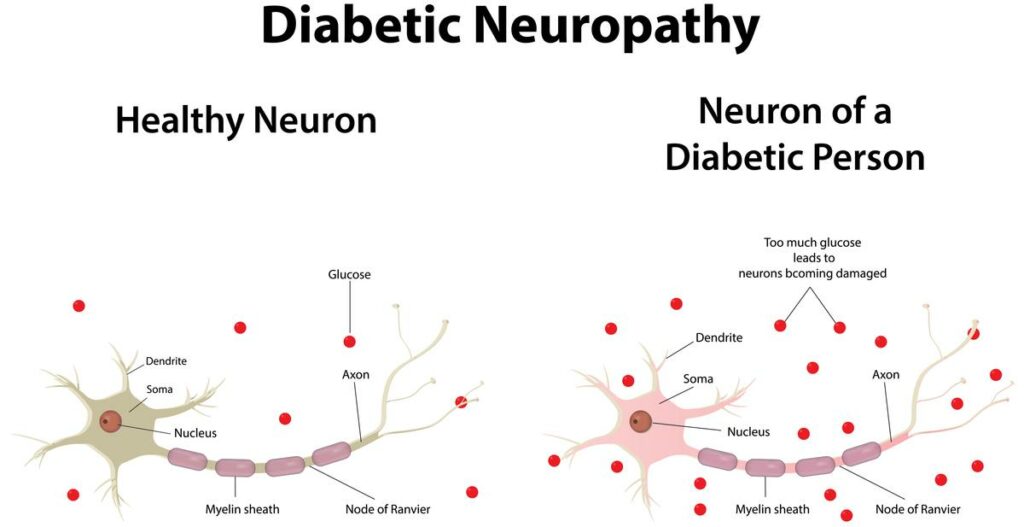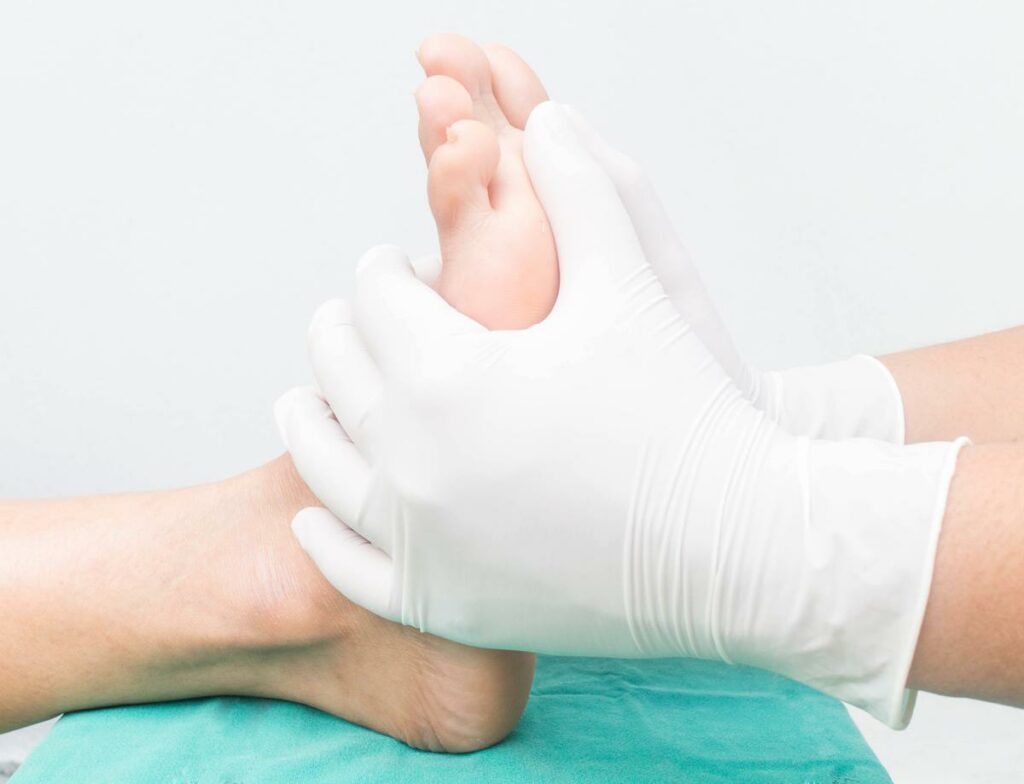Diabetic neuropathy can significantly impact the lives of individuals with diabetes, causing nerve damage and leading to a range of distressing symptoms. In this comprehensive guide, we delve into effective strategies to treat diabetic neuropathy and provide valuable insights for managing its symptoms.
Diabetic neuropathy is a condition that occurs when high blood sugar levels associated with diabetes damage the nerves, resulting in pain, tingling, numbness, and weakness, primarily in the extremities. It is crucial to understand the importance of seeking proper treatment to alleviate these symptoms and prevent further nerve damage.
Throughout this guide, we will explore various medical treatments, lifestyle modifications, and alternative therapies that can help individuals with diabetic neuropathy find relief and enhance their overall quality of life.
By following the information provided here, you will gain a deeper understanding of how to effectively manage and treat this challenging condition.
Understanding Diabetic Neuropathy
Diabetic neuropathy encompasses a group of nerve disorders that can affect individuals with diabetes.
It is essential to gain a comprehensive understanding of this condition to effectively manage and treat its symptoms.
If you have this condition, you will notice numbness in your body along with weakness, pain, tingling in your feet or your hands, and more. Generally, the condition develops slowly. It can be developed even for some decades.

These are the symptoms of peripheral neuropathy. These symptoms are normal. But it will be dangerous if there is no pain you feel but it still develops in your foot. There are also different kinds of neuropathy that cause serious damage in different areas of your body. And the symptoms are also different.
You can also experience vulnerable infractions and injuries too. And if the infections settle in that area for a long time, it can lead to amputation. It will be a wise decision to check your blood sugar levels regularly. Also, contact your doctor if there are any symptoms you find.
What Are The Different Types Of Diabetic Neuropathy?
Neuropathy can describe a lot of types of nerve damage. And diabetic neuropathy explains nerve damages that cause when you have diabetes. In that case, you will find four types of neuropathy. Such as:
Autonomic Neuropathy
In this neuropathy, this autonomic nervous system runs other types of systems. In this condition, you have no control. It controls your digestive system, cardiovascular system, sweat glands, and even sex organs and bladder.
For that reason, you might face different digestive problems like diarrhea, constipation, gastroparesis, and trouble swallowing. You can also have several sexual bladder problems like vaginal dryness, erectile dysfunction, and difficulty getting orgasm.
There could be some cardiovascular problems such as nausea, pain in the back, arm, neck, stomach, and more.
Peripheral Neuropathy
This is the most common form of neuropathy. You usually don’t feel the pain when you have this neuropathy. It generally affects your legs and feet. It also affects the hands and arms. You will feel a tingling and burning sensation.
You might also have muscle weakness, numbness, cramping, extreme sensitivity to touch, loss of balance or coordination, insensitivity to hot and cold temperatures, and more like that.
Focal Neuropathy
Focal neuropathy is also called mononeuropathy. It damages a specific area of the nerve or a group of nerves. That is why it creates a weakness in that specific area. One positive thing about this is it goes away within a few weeks or months. It doesn’t leave any damage behind.
This neuropathy often occurs in the head, hands, legs, or torso. This is a common type of carpal tunnel syndrome and it appears suddenly. The common symptoms of this neuropathy are double vision, numbness, pain and tingling in fingers, inability to focus, aching behind the eyes, Bell’s palsy, and more.
Proximal Neuropathy
Proximal neuropathy is a rare form of neuropathy. It is also known as diabetic amyotrophy. This neuropathy generally occurs in adults, more often in men who are over 50 years old.
It happens suddenly just like Focal Neuropathy. It can affect the thighs, hips, and buttocks. It sometimes gives you severe pain and makes the muscles of your legs so weak that you might not be able to stand up with anybody’s help.
However, it can be cured. The person can be recovered within a few years, sometimes without any treatment and that is a positive side of it.
Symptoms Of Diabetic Neuropathy
Several symptoms are there to identify if you have diabetic neuropathy or not. All the symptoms are common and they appear gradually. And the symptoms are:
- Diarrhea or constipation
- Sensitivity to touch
- Muscle weakness or wasting
- Bladder problems
- Nausea or vomiting
- Vaginal dryness
- Bloating
- Dizziness when you stand up
- Vision trouble
- Inability to sense low blood glucose
- Increased heart rate
- Loss of sense of touch
- Burning sensation
Causes Of Diabetic Neuropathy
Diabetic neuropathy is generally caused by high blood glucose levels that are sustained for a long time. It also appears because of low levels of vitamin B-12.
Also, if you have high cholesterol levels, you can have diabetic neuropathy as it damages the blood vessels. Moreover, alcohol and smoking can also develop diabetic neuropathy.
Besides, it can also happen because of any mechanical injury. Further, there is a medicine named Metformin that is used to manage diabetes. It also decreases the levels of vitamin B-12.
That is why diabetic neuropathy might develop. You can ask your doctor to do a test to identify the cause behind it and if there is any vitamin deficiency or not.
Diagnosing Diabetic Neuropathy
Your doctor will suggest if you need to diagnose your diabetic neuropathy or not. First, you need to be sure whether you have this neuropathy or not. Also, you need to know the causes and match the symptoms as well.

Also, explain your medical history to your doctor if he doesn’t know yet. Do the physical test as well and check all the details by your doctor. And then your doctor will suggest you the best.
Your doctor might also do a filament test to test your feet’ sensitivity. He will also examine your heart rate, blood cholesterol levels, blood pressure, sensitivity to touch and temperature, muscle tone and more that you need. That is the way it should happen.
Diabetic Neuropathy Treatments
If you want to go with the treatments to cure diabetic neuropathy, you can do that. But keep in mind that it is a slow process. The progression will also be slow. But it keeps your blood sugar levels in control. It can also decrease and relieve some of the symptoms. Let’s see how it works.
Complications Management
You need to manage the complications according to your type of neuropathy. The doctor can suggest what’s best for you. There are several options out there like therapies, medications, lifestyle changes and more. These help you a lot to deal with the symptoms and relieve you from the symptoms.
Pain Management
To treat pain, you can go with some medications. It treats pain well caused by diabetic neuropathy. However, medications might have some side effects. You need to discuss it to your doctor to know what kind of problems you might face.
You can also go with some alternative therapies if you want to avoid side effects. Talk to your doctor and then decide.
Lifestyle Modifications
In addition to medication, there are a number of lifestyle modifications that can help to manage diabetic neuropathy. These include:
- Maintaining good blood sugar control. This is the most important thing you can do to reduce your risk of developing diabetic neuropathy and to slow the progression of the condition if you already have it.
- Regular exercise. Exercise can help to improve blood sugar control, reduce pain, and improve nerve function.
- A healthy diet. A healthy diet that is rich in vitamins and minerals can help to support nerve health.
- Quitting smoking. Smoking can damage the nerves and worsen diabetic neuropathy.
- Moderating alcohol consumption. Alcohol can also damage the nerves and worsen diabetic neuropathy.
Alternative Therapies
There are a number of alternative therapies that have been shown to be effective in managing diabetic neuropathy. These include:
- Acupuncture. Acupuncture is a traditional Chinese medicine treatment that involves inserting thin needles into the skin at specific points. Acupuncture has been shown to be effective in reducing pain and improving nerve function in people with diabetic neuropathy.
- Biofeedback. Biofeedback is a technique that teaches you to control your body’s responses to stress. Biofeedback can help to reduce pain and improve nerve function in people with diabetic neuropathy.
- Transcutaneous electrical nerve stimulation (TENS). TENS is a therapy that uses mild electrical currents to stimulate the nerves. TENS can help to reduce pain and improve nerve function in people with diabetic neuropathy.
Self-Care and Home Remedies
There are a number of self-care and home remedies that can help to manage diabetic neuropathy. These include:
- Proper foot care. Taking care of your feet is essential to prevent complications from diabetic neuropathy, such as foot ulcers and infections. Make sure to inspect your feet daily for any signs of injury or infection.
- Managing pain and discomfort. There are a number of things you can do to manage pain and discomfort from diabetic neuropathy, such as using heat or cold therapy, taking over-the-counter pain relievers, and using topical creams.
- Maintaining a healthy lifestyle. Eating a healthy diet, exercising regularly, and quitting smoking can all help to manage diabetic neuropathy.
Wrap Up
To treat the diabetic neuropathy well, first you need to be sure about what it is and what the causes are. Also, you should be careful about the symptoms and then check out the details about how to treat diabetic neuropathy.
Make sure you talk to your doctor because he can give you the best advice for you. Do not panic because it can be cured if you are conscious enough.




